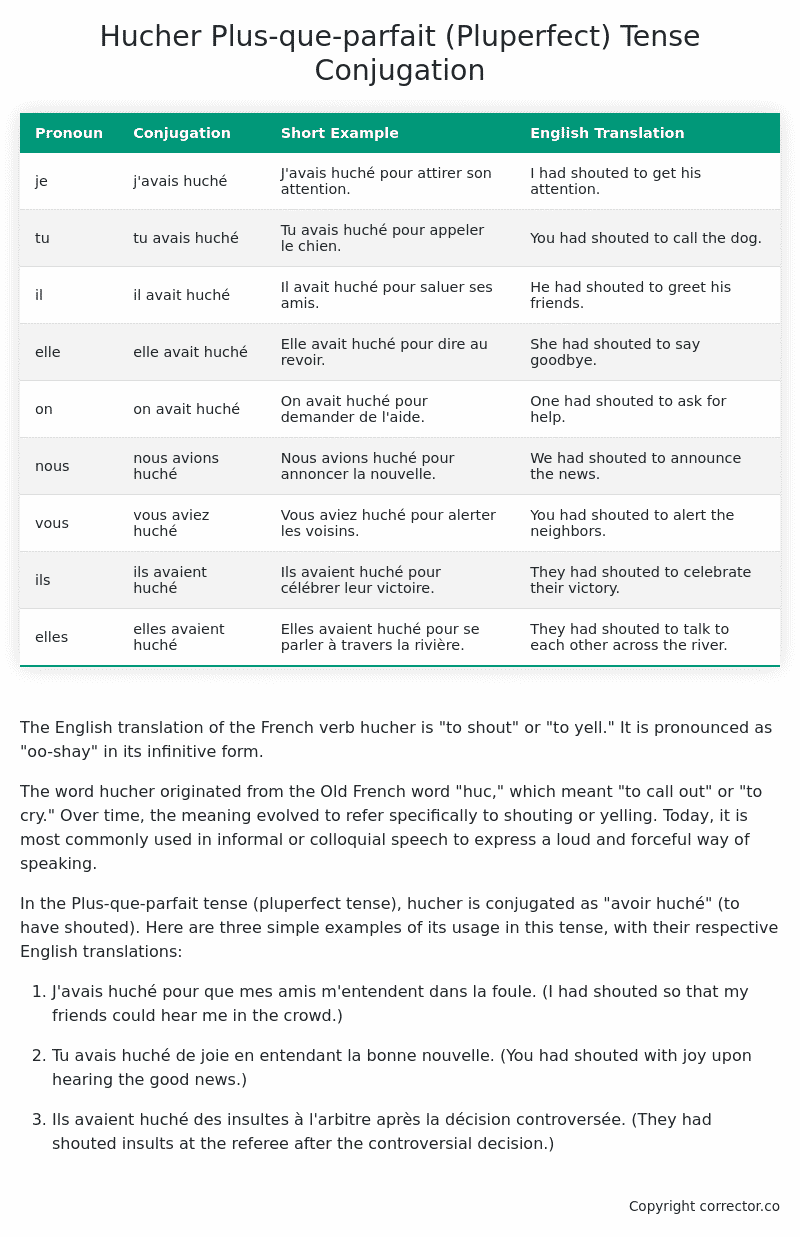Plus-que-parfait (Pluperfect) Tense Conjugation of the French Verb hucher
Introduction to the verb hucher
The English translation of the French verb hucher is “to shout” or “to yell.” It is pronounced as “oo-shay” in its infinitive form.
The word hucher originated from the Old French word “huc,” which meant “to call out” or “to cry.” Over time, the meaning evolved to refer specifically to shouting or yelling. Today, it is most commonly used in informal or colloquial speech to express a loud and forceful way of speaking.
In the Plus-que-parfait tense (pluperfect tense), hucher is conjugated as “avoir huché” (to have shouted). Here are three simple examples of its usage in this tense, with their respective English translations:
-
J’avais huché pour que mes amis m’entendent dans la foule.
(I had shouted so that my friends could hear me in the crowd.) -
Tu avais huché de joie en entendant la bonne nouvelle.
(You had shouted with joy upon hearing the good news.) -
Ils avaient huché des insultes à l’arbitre après la décision controversée.
(They had shouted insults at the referee after the controversial decision.)
Table of the Plus-que-parfait (Pluperfect) Tense Conjugation of hucher
| Pronoun | Conjugation | Short Example | English Translation |
|---|---|---|---|
| je | j’avais huché | J’avais huché pour attirer son attention. | I had shouted to get his attention. |
| tu | tu avais huché | Tu avais huché pour appeler le chien. | You had shouted to call the dog. |
| il | il avait huché | Il avait huché pour saluer ses amis. | He had shouted to greet his friends. |
| elle | elle avait huché | Elle avait huché pour dire au revoir. | She had shouted to say goodbye. |
| on | on avait huché | On avait huché pour demander de l’aide. | One had shouted to ask for help. |
| nous | nous avions huché | Nous avions huché pour annoncer la nouvelle. | We had shouted to announce the news. |
| vous | vous aviez huché | Vous aviez huché pour alerter les voisins. | You had shouted to alert the neighbors. |
| ils | ils avaient huché | Ils avaient huché pour célébrer leur victoire. | They had shouted to celebrate their victory. |
| elles | elles avaient huché | Elles avaient huché pour se parler à travers la rivière. | They had shouted to talk to each other across the river. |
Other Conjugations for Hucher.
Le Present (Present Tense) Conjugation of the French Verb hucher
Imparfait (Imperfect) Tense Conjugation of the French Verb hucher
Passé Simple (Simple Past) Tense Conjugation of the French Verb hucher
Passé Composé (Present Perfect) Tense Conjugation of the French Verb hucher
Futur Simple (Simple Future) Tense Conjugation of the French Verb hucher
Futur Proche (Near Future) Tense Conjugation of the French Verb hucher
Plus-que-parfait (Pluperfect) Tense Conjugation of the French Verb hucher (this article)
Passé Antérieur (Past Anterior) Tense Conjugation of the French Verb hucher
Futur Antérieur (Future Anterior) Tense Conjugation of the French Verb hucher
Subjonctif Présent (Subjunctive Present) Tense Conjugation of the French Verb hucher
Subjonctif Passé (Subjunctive Past) Tense Conjugation of the French Verb hucher
Subjonctif Imparfait (Subjunctive Imperfect) Tense Conjugation of the French Verb hucher
Subjonctif Plus-que-parfait (Subjunctive Pluperfect) Tense Conjugation of the French Verb hucher
Conditionnel Présent (Conditional Present) Tense Conjugation of the French Verb hucher
Conditionnel Passé (Conditional Past) Tense Conjugation of the French Verb hucher
L’impératif Présent (Imperative Present) Tense Conjugation of the French Verb hucher
L’infinitif Présent (Infinitive Present) Tense Conjugation of the French Verb hucher
Struggling with French verbs or the language in general? Why not use our free French Grammar Checker – no registration required!
Get a FREE Download Study Sheet of this Conjugation 🔥
Simply right click the image below, click “save image” and get your free reference for the hucher Plus-que-parfait tense conjugation!

Hucher – About the French Plus-que-parfait (Pluperfect) Tense
Tense Formation
Common everyday usage patterns
Sequencing of past events
Background information
Hypothetical or reported speech
Interactions with other tenses
Summary
I hope you enjoyed this article on the verb hucher. Still in a learning mood? Check out another TOTALLY random French verb conjugation!


